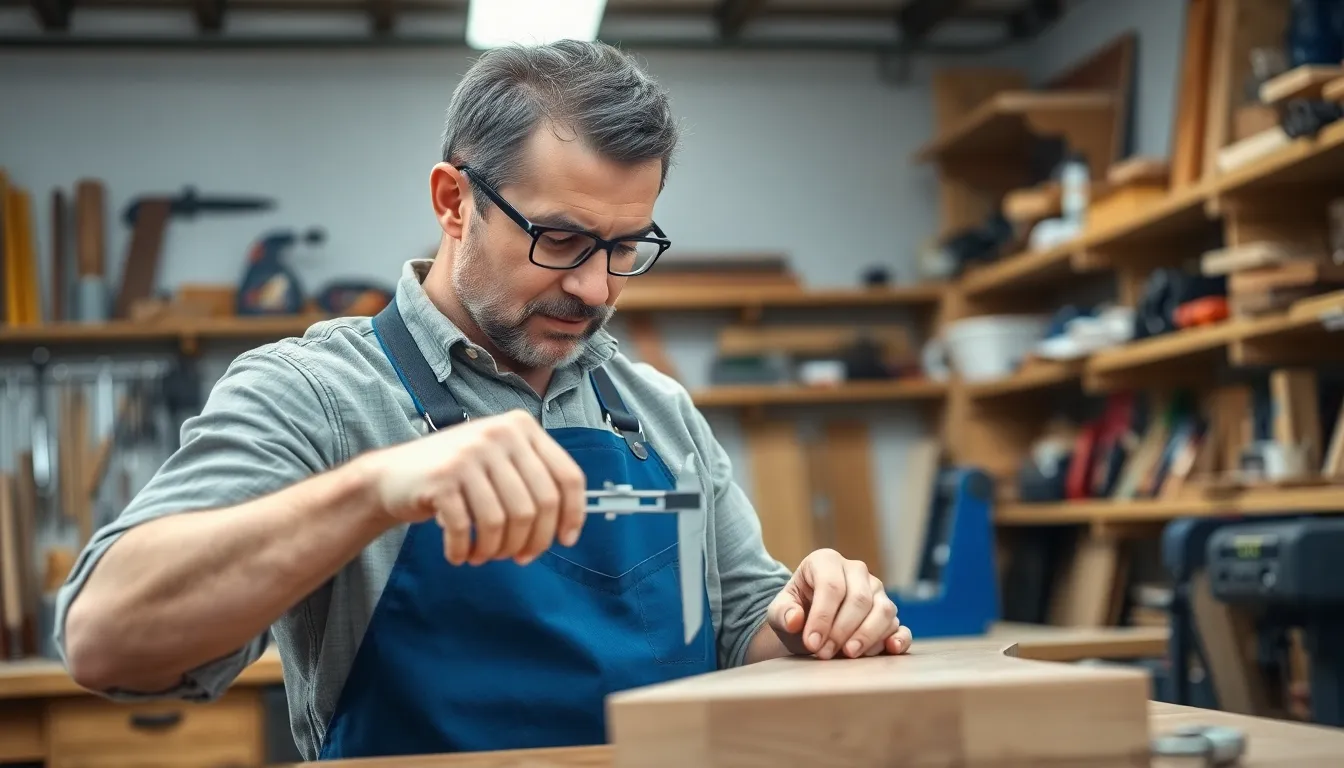In a world where even the tiniest miscalculation can lead to disaster, precision tools emerge as the unsung heroes of craftsmanship. Whether it’s a woodworker crafting a stunning piece of furniture or an engineer designing the next big innovation, these tools are the secret weapon that ensures every measurement hits the mark.
Imagine trying to assemble a complex puzzle with pieces that just don’t fit—frustrating, right? That’s what working without precision tools feels like. From calipers to laser levels, these instruments not only save time but also keep sanity intact. Dive into the realm of precision tools, and discover how they can turn even the most chaotic projects into a symphony of accuracy. After all, who wouldn’t want to wield the power of perfection?
Table of Contents
ToggleOverview Of Precision Tools
Precision tools serve critical roles across various industries and applications. These instruments deliver accuracy, enhancing the quality of work and ensuring precise results. Tools like calipers, micrometers, and laser levels exemplify the types of devices that contribute to flawless craftsmanship.
Calipers, essential for measuring internal and external dimensions, offer both metric and imperial readouts. Users appreciate their versatility in tasks ranging from woodworking to metal fabrication. Micrometers provide even greater precision, allowing measurements within thousandths of an inch. They become indispensable for anyone requiring detailed analysis in mechanical engineering or manufacturing.
Laser levels utilize technology to establish accurate horizontal and vertical planes. These tools simplify alignment and leveling tasks, especially in construction and renovation projects. Adopting laser levels streamlines workflows, reducing potential errors that manual leveling methods might introduce.
Digital micrometers and calipers now integrate advanced features, such as data output and memory functions. Users benefit from enhanced ease of use and efficiency through digital displays. Maintaining a focus on precision, these modern iterations cater to diverse needs across multiple fields.
Understanding the importance of precision tools helps professionals achieve superior results. Investing in quality instruments fosters an environment of accuracy, ultimately leading to higher standards in projects. Whether in engineering, construction, or crafting, the use of precision tools transforms ordinary tasks into exceptional outcomes.
Types Of Precision Tools

Precision tools encompass a broad range of instruments designed for accuracy. Each type serves a unique purpose and contributes to high-quality craftsmanship.
Measuring Tools
Measuring tools are vital for determining dimensions with precision. Calipers offer versatility by measuring inside and outside diameters, depths, and steps. Micrometers provide even finer measurements, essential for tasks in mechanical engineering and machining. Laser distance meters enhance measurement convenience by providing fast and accurate results over long distances. Digital measuring tools often feature displays with easy-to-read information, improving clarity and efficiency.
Cutting Tools
Cutting tools are crucial for achieving clean and precise cuts. Band saws allow for intricate cutting of various materials, ensuring consistent results. Circular saws cater to a broader range of cutting tasks, excelling in making straight cuts in various settings. Precision knives provide the control needed for detailed work, such as in craft and hobby projects. Each tool has its specific application, allowing professionals to select the ideal instrument for their needs.
Hand Tools
Hand tools play an essential role in precision tasks, allowing for meticulous manipulation of materials. Screwdrivers come in various sizes and types, enabling users to fasten and unfasten screws with precision. Pliers provide gripping capabilities, making it easier to bend or cut wire accurately. Wrenches offer the necessary torque for tightening or loosening nuts and bolts. The right hand tool enables craftspeople to execute detailed work efficiently and effectively.
Benefits Of Using Precision Tools
Precision tools offer substantial benefits across various industries, enhancing work quality and project outcomes.
Increased Accuracy
Precision tools significantly improve accuracy in measurements and alignments. Calipers and micrometers provide detailed measurements down to micrometers, ensuring precision in engineering tasks. Laser levels offer alignment assurance, critical for construction projects. Projects requiring exact specifications achieve better results with these tools. Reduced errors lead to minimized material waste and lower costs. Quality assurance processes benefit from enhanced measurement accuracy, making it easier to meet industry standards. With the reliability of precision tools, maintaining consistency in work becomes achievable.
Enhanced Efficiency
Enhanced efficiency is a key advantage of using precision tools. These tools streamline workflows by providing immediate and reliable results. For example, digital calipers often feature memory functions, allowing users to save measurements for later use. Tasks that typically consume time become quicker and easier with laser distance meters for measuring distances accurately. Specialized cutting tools ensure clean cuts, reducing the need for rework and material wastage. Time savings translate into cost reductions, giving businesses a competitive edge in their industries. Overall, precision tools enable professionals to focus on quality while completing tasks faster.
Applications Of Precision Tools
Precision tools serve various critical functions across multiple industries. These instruments promote accuracy and efficiency, simplifying complex tasks.
Manufacturing Industry
In the manufacturing industry, precision tools play a vital role in achieving quality outcomes. Calipers and laser measurement tools ensure that components meet exact specifications. During assembly, precision tools reduce the risk of tolerances being exceeded. Automated manufacturing lines utilize these instruments for consistent measurement, leading to fewer defects in production. Instruments like CNC machines rely heavily on precision tools for cutting and fitting processes. Overall, precision tools enhance productivity and ensure that products meet not only industry standards but also customer expectations.
Engineering Sector
The engineering sector benefits significantly from precision tools, which facilitate detailed project development. Micrometers deliver accurate measurements necessary for engineering designs and prototypes. Engineers often rely on laser levels to verify alignment in structures, ensuring integrity and safety. This sector frequently utilizes tools for quality control inspections, where precision is paramount. Recent innovations have introduced digital measuring tools that streamline data recording and analysis. With precision tools, engineers enhance project efficiency while maintaining rigorous standards of accuracy, ultimately driving innovation in designs and solutions.
Precision tools are indispensable assets in achieving high-quality results across various industries. Their ability to enhance accuracy and efficiency transforms chaotic tasks into streamlined processes. By investing in tools like calipers and laser levels, professionals can elevate their craftsmanship and ensure meticulous outcomes.
As technology advances, the evolution of precision tools continues to support innovation in fields such as manufacturing and engineering. Embracing these tools not only reduces errors but also promotes a culture of excellence. Ultimately, the pursuit of precision is a commitment to quality that pays off in every project.




